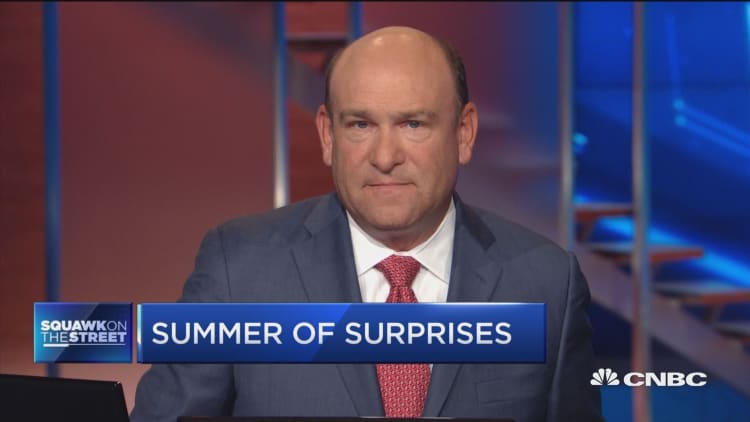
A recent spate of positive data has heightened hopes that the U.S. economy is vanquishing its many demons.
Whether it was the blockbuster June payrolls number, the strong retail growth earlier this month, or something more recent such as Tuesday's reported jump in new home sales, indicators have been on balance considerably better than expectations.
That's got Wall Street excited that after a long period of mediocrity, the economy finally may have reached an inflection point. However, the optimism may not be on particularly solid ground, with the economy likely still trudging along despite some recent positive surprises.
The Street closely follows a barometer called the Citi U.S. Economic Surprise Index. The measure is different from others in that it depends less on what the actual data readings are and more on how they compare with expectations.
A reading above zero means that the data on balance are coming in above expectations, while a negative reading indicates an economy that is underperforming. Lately, indicators have been crushing estimates, after the index spent a year and a half in negative territory. Paul Hickey at Bespoke Investment Group noted in a tweet Tuesday that the index is in clear "breakout" mode as judged by its behavior over the past 12 months:
Periods when the index rises into positive territory often are positive for stocks. Over the past decade, the was higher 79 percent of the time with a median gain of 5.2 percent six months after periods when the surprise index rose above zero, according to Burt White, chief investment officer at LPL Financial.
"We have also observed better performance from the more economically sensitive sectors in these scenarios. Both good signs," White said in a note to clients.
A few words of caution, though, are warranted before getting too excited about this "surprise."
Most notably, the breakout that Hickey observed came in early July and coincided with the realization that the Brexit vote would not, in fact, be the end of the world. A look at the index from the beginning of July tells the story:
Britain's vote to leave the European Union jolted the financial markets and worried economists that the move would be destabilizing and possibly create a widespread recession. However, even the International Monetary Fund, which had been a leading voice in raising Brexit alarms, has since conceded that while Brexit likely will cause a slowdown, the consequences appear considerably less dire than originally feared.
As the rest of the world was left to ponder what would happen after the vote, economists ratcheted down their expectations, resulting in numbers that were fairly easy to beat. That adage about economists predicting nine of the last five recessions seemed to apply once again.
That's why some are cautioning against reading too much into the surprise index over the short term.
"The Citi index is more reflective of Wall St economists that were more pessimistic than needed rather than a sign of an economic acceleration," Peter Boockvar, chief market analyst at The Lindsey Group, said in a recent note. Boockvar pointed out that U.S. economic growth overall remains fixed along the same middling path it has been since the end of the Great Recession.
Indeed, the Atlanta Fed is projecting the second quarter to register gross domestic product growth of just 2.4 percent, coming off the modest 1.4 percent expansion in the first quarter. That's actually lower than the 2.7 percent projected at the beginning of the month, meaning that the Atlanta Fed's tracker, which has been fairly accurate, actually has weakened even as the Citi surprise index has shot higher.
The government will release its second-quarter GDP estimate Friday. In the meantime, the Federal Reserve meets this week and is unlikely to announce a rate hike when it releases its post-meeting statement Wednesday, despite the better-than-expected data.
Correction: This version corrects the name of the International Monetary Fund.


